In this module, Cate introduces the DDPE module series by discussing why it is so important to get an accurate diagnosis. She does so by demonstrating a real-life evaluation step by step.
Cate introduces the module series explaining the process of evaluating a child, Alex, from the parent questionnaire to developing IEP goals for the child. This module will focus on the background information Cate gathered about Alex. This included previous evaluations and therapy the child had received. Cate reveals that the child was assessed with standardized tests that were not appropriate and did not gain the necessary information to produce an accurate diagnosis. As a result, Alex did not receive the therapy he needed in a timely manner.
Please find related materials here:
Current Research on Non-Speech Oral Motor Exercises
Model Eval: 2;10-English/Spanish- Verbal Apraxia
Model Eval: 2;10- Verbal Apraxia IEP Goals
Find the playlist for the full set of videos in this module series here:
Differential Diagnosis in Preschool Evaluations: A Case Study (DDPE Playlist)
Find each of the modules from this playlist here:
Module 1: Why an Accurate Differential Diagnosis Matters
Module 2: Critical Questions for the Parent Interview Part 1
Module 3: Critical Questions for the Parent Interview Part 2
Module 4: Academic Language Expressive and Receptive Language
Module 5: Receptive Language Comprehension and Following Directions
Module 6: Eliciting Quality Narratives in Expressive Language
Module 7: Motor Speech, Articulation, and Speech Sound Inventory
Module 8: Dynamic Assessment: Nonword Repetition, Syllable and Sentence Repetition
Module 9: Putting it All Together in the Written Evaluation Report
Module 10: Developing Appropriate Goals for the IEP
Please find links to research mentioned in this module here:
Christensen, M., & Hanson, M. (1981). An investigation of the efficacy of oral myofunctional therapy as a precursor to articulation therapy for pre-first grade children. Journal of Speech and Hearing Disorders, 46, 100-167. http://jshd.pubs.asha.org/article.aspx?articleid=1774894
Lass, N. J., & Pannbacker, M. (2008). The application of evidence-based practice to nonspeech oral motor treatments. Language, Speech, and Hearing Services in Schools, 39, 408-421. http://lshss.pubs.asha.org/article.aspx?articleid=1778842
Ruscello, D. M. (2008). Nonspeech oral motor treatment issues related to children with developmental speech sound disorders. Language, Speech, and Hearing Services in Schools, 39, 380-391. http://lshss.pubs.asha.org/article.aspx?articleid=1778840
Smit, A. B., Hand, L., Freilinger, J. J., Bernthal, J. E., & Bird, A. (1990). The Iowa Articulation Norms Project and its Nebraska replication, Journal of Speech and Hearing Disorders, 55, 779-798. http://jslhr.pubs.asha.org/article.aspx?articleid=1780453


![[feed link]](/wp-content/plugins/rss-just-better/rss-cube.gif)